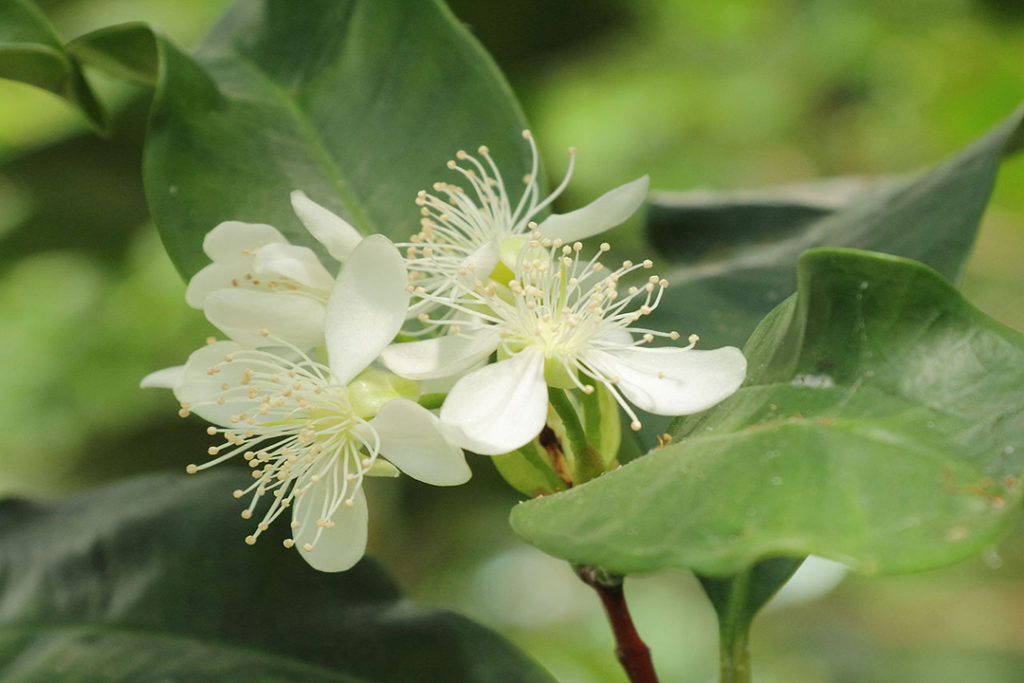
Jamaica
Allspice Tree
Pimenta dioica

General Description / Cultural Significance
The aromatic allspice tree, or Pimenta dioica, is the most culturally significant scent in Jamaica. A West Indian tree from the Myrtaceae family, its fruit grows green and eventually turns into a small blackish bead with a spicy scent. A useful spice comes from this fruit, whose leaves are also very fragrant and strong-smelling when crushed. The allspice tree gets its name because it smells and tastes like many different spices, including cinnamon, clover, juniper and pepper. It is the base for many seasonings. A pimento “dram,” or sticky sauce is made and used to season meats. “Jerking” pork means smoking it with pimento wood, and this is a traditional way of seasoning food that is still used today. Pimento oil, known to relieve muscle cramps and to treat scalp conditions, is also a very expensive and significant export for Jamaica. Allspice is also known to be antibacterial, and potentially both anticancer and antitumor. In addition to being a culinary staple for Jamaicans and people around the world, its medical properties are extensive and being further researched.
Climate Change/Conservation Status
Rising temperatures and increased intensity of rainfall have already affected Jamaica. Jamaican tourism mostly occurs in coastal areas, meaning extreme weather like this as well as rising sea levels is increasingly affecting tourism and subsequent income for Jamaica. In 2020 Jamaica became the first Caribbean nation to join the Paris Agreement in order to curb greenhouse gas emissions in several sectors and therefore mitigate the intense climate change effects it is already experiencing. Livelihoods in both fishing and agricultural sectors were greatly impacted by climate change, as well as Covid-19. Certain communities are especially at risk for flooding because of inability to drain water after intense rainfalls, while others lack proper access to water during dry periods and droughts. Both better infrastructure and emissions reduction will hopefully help these at-risk communities.
The International Union for Conservation of Nature (IUCN) lists allspice as not endangered at this time.
Alternate Names
Jamaica pepper
Myrtle pepper
Pimenta
Pimento
Sources
Botanic Gardens Conservation International (BGCI) & IUCN SSC Global Tree Specialist Group, 2019. Pimenta dioica. The IUCN Red List of Threatened Species. [website] DOI: 10.2305/IUCN.UK.2019-3.RLTS.T103121329A150119410.en.
Doyle, A., 2020. Jamaica becomes first Caribbean nation to submit tougher climate plan to UN. Climate Home News. [website]
Jamaica Trade Commission, Committee for National Symbols in Jamaica and The University of the West Indies. This statement can be found on the World Sensorium original website.
Thompson, T., n.d. Climate Change in Jamaica. Aksik. [website]
Zhang, L., & Lokeshwar, B.L., 2012. Medicinal Properties of the Jamaican Pepper Plant Pimenta dioica and Allspice. Curr Drug Targets, [website] 13(14), pp. 1900–1906. DOI: 10.2174/138945012804545641

